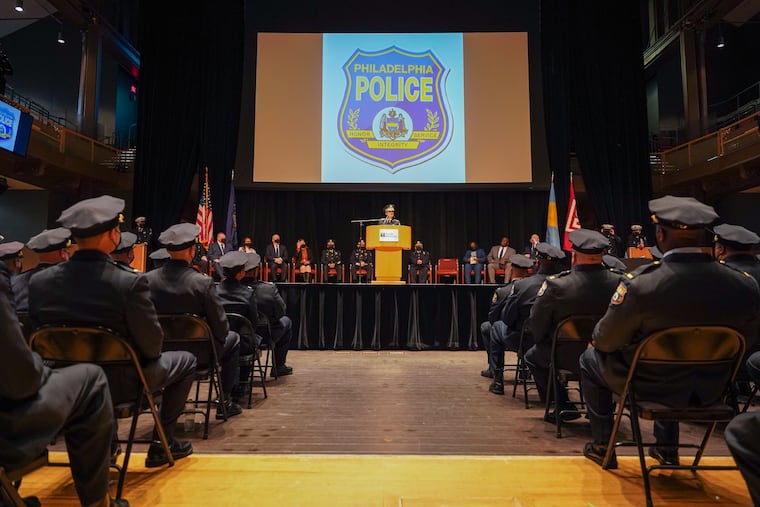Some Philly police officers with checkered pasts have new jobs thanks to PPD’s latest promotions
Police reformists say the personnel moves are a reflection of the department’s longstanding struggle to discipline officers.

Amid changes in leadership inside the Philadelphia Police Department earlier this month, a reshuffling of key roles handed new jobs to a few officers with missteps in their past.
Last week, Police Commissioner Danielle Outlaw — in her second shakeup in less than a year — announced several dozen promotions and transfers to officers across units and ranks. Among them were new roles for at least three people who previously faced disciplinary proceedings, but now hold high-ranking positions, including as district captains.
A spokesperson for the Police Department said those disciplinary issues have been resolved — some as long as a decade ago — and happened before Outlaw took over the department. For that reason, she said, the officers involved are “not precluded from a civil service promotion.”
And John McNesby, the president of the Fraternal Order of Police Lodge 5, said remedied disciplinary matters should not hamper an officer’s career.
“Whatever happened in their private case or criminal case was rectified,” McNesby said. “They’re back in the department. They should have the same opportunities as everyone else.”
But police reformists say the personnel moves are a lamentable reflection of the department’s long-standing struggle to discipline officers, and point to the need to overhaul the department’s internal investigative methods and outcomes to regain the public’s trust.
Among those transferred into a new role was Chief Inspector Anthony Boyle, who was fired in 2020 after an Internal Affairs investigation found neglect of duty, failure to supervise, and conduct unbecoming an officer.
In 2017, when he oversaw the narcotics unit, Boyle allegedly supervised a meeting at which officers were instructed to falsify reports in drug cases as part of an effort to “flip” suspects into confidential informants, according to police records. He was also accused of physically attacking a female officer, hurling racist insults, and hiding information from the District Attorney’s Office.
Last summer, an arbitrator overturned Boyle’s dismissal, saying it violated policy. The decision required that he be rehired and retain his rank as chief inspector, overseeing the narcotics unit.
In an interview, Boyle said that the arbitration settlement speaks for itself and that the people who accused him of misconduct had not been truthful.
“I think I’m well deserved in receiving this assignment,” he said.
In his new job, he will oversee the department’s Tactical Support Bureau, which includes the Highway Patrol Unit, the Traffic Unit, the Tow Squad, and the Civil Affairs Unit.
Jasmine Reilly, a spokesperson for the Police Department, said in a statement that reinstating Boyle was required by the arbitration ruling.
Also among those promoted was Capt. Marques Newsome, who has been tapped to lead the 15th Police District in Northeast Philadelphia. Newsome was fired in 2013 after he was charged with aggravated assault and stalking for allegedly assaulting his girlfriend, breaking multiple bones in her face.
Newsome told investigators the woman attacked him first during a confrontation inside her West Philadelphia home and injured herself after he pushed her away in self-defense. The criminal charges were later dropped after a witness failed to appear in court, and Newsome returned to the force.
Newsome declined to comment when reached by phone.
Also benefitting from the reshuffling was Capt. Shaun Butts, who was elevated from the department’s radio room to lead the 17th District, in Point Breeze. Butts was suspended for three days in 2011 after he lost his department-issued gun, and was required to pay for the lost weapon.
Three years later, Internal Affairs took away his gun after he was accused of improperly releasing three shooting suspects without questioning them, confiscating their weapons or entering them into police records. Butts later admitted to neglect of duty and failure to supervise, and was suspended for six days, department officials said.
He could not be reached for comment.
Advocates of police reform questioned the decision to reward officers with allegations of misconduct in their past, but said the department was hampered by a flawed arbitration system that sometimes forces top officials to hire back — or even promote — problem officers.
“They don’t really have a lot of leeway over it,” said Anthony Erace, interim executive director of the Citizens Police Oversight Commission, a city agency that analyzes and works to reform policing policies.
“It’s the equivalent of being found not guilty, and once you’re found not guilty, are you punished for the crime?” he asked. “No.”
An Inquirer analysis found that between 2011 and 2019, in cases where officers appealed disciplinary actions, arbitrators reduced or overturned the penalties 70% of the time.
Hans Menos, of the Center for Policing Equity, also acknowledged the failures of a disciplinary and arbitration system, but he criticized department officials for giving leadership roles to officers who have faced allegations of misconduct in the past.
“We’re always saying how important leadership is,” said Menos, the former head of the Philadelphia Police Advisory Commission. “It sets the tone.”
The department must work to regain the public’s trust, in large part by overhauling its disciplinary and arbitration systems, Erace said. If not, there’s a lot on the line.
“It affects everything, from homicide clearance rates to whether people report crimes,” he said. “It’s incredibly important for the department to address it.”